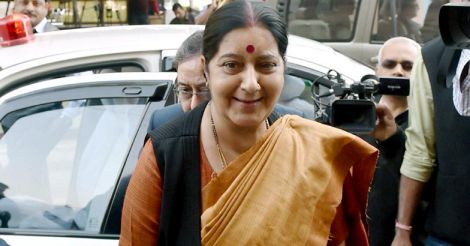External Affairs Minister Sushma Swaraj's suggestion that the Bhagavad Gita should be given the honour of being the national scripture or national book has triggered a controversy. Swaraj has said the Gita is the largest selling book and which gives guidelines on following dharma, her critics are seeing it as an attempt of saffronisation by the Narendra Modi government, after moves to make study of Sanskrit compulsory in the central education system. This comes close on the claims of the Indian council of historical research chairman insisting that Mahabharata and Ramayana are not epics, but actual history.
On the other hand West Bengal Chief Minister Mamata Banerjee has argued that the constitution is the national scripture as the Indian society and citizens are bound by the principles enshrined in the constitution. Others have argued that the constitution with its emphasis on equality, fraternity and liberty has harmonised the great teachings of the religious texts and the Indian state is running on these principles for the last 64 years, ever since the constitution came into force.
But Sushma's supporters argue that the Bhagavad Gita, which is a part of the Mahabharata epic, is one of the oldest scriptures, though the most ancient are the Vedas and Upanishads, which even pre date the Bhagavad Gita. There are people who argue that the holy books of other religions should also be considered for the same status as the Gita. But the third group argues that whether India needs any one book, however ancient or all pervasive, to be named as the national scripture.
The demand for making Gita as a national treasure is not a new one. It has been translated and interpreted by political and spiritual leaders like Mahatama Gandhi, Bal Gangadhar Tilak and Vinoba Bhave before independence. Gita has been the subject of the modern day management studies with the argument that its tactics are applicable to modern ways of running governments and large corporations.
But Prime Minister Narendra Modi has not given his opinion on these cultural suggestions of his women colleagues in the cabinet, focusing his attention on governance issues. But his silence is interpreted by the vociferous members of the BJP as a tacit endorsement of their claims. The opposition has argued that Modi is the centre of the organised plan to change the secular fabric of the country, whereby overt symbols of Hidutva are enforced on all sections of the population through the education and government systems. The law defining national emblems and symbols does not have any criteria for determining a national scripture or book. The last time there was a debate on a national symbol was when there was a demand to adopt Vande Mataram as National Anthem along with Janaganamana. the government settled the issue by declaring Janaganamana as the National Anthem and Vande Matharam as the National Song.
Tailpiece: Even before the merger of five Janata factions becomes a reality, the leaders of Samajwadi Party, Janata Dal (united), Janata Dal (Secular), Indian National Lok Dal and Rashtriya Janata Dal parties are taking steps to ensure they retain control over properties owned by their respective parties, and everything does not come under the thumb of Mulayam Singh Yadav , who will be president of new party called Samajwadi Janata Dal.











































































































































































































































 External Affairs Minister Sushma Swaraj (file photo)
External Affairs Minister Sushma Swaraj (file photo)
Disclaimer
The comments posted here/below/in the given space are not on behalf of Manorama. The person posting the comment will be in sole ownership of its responsibility. According to the central government's IT rules, obscene or offensive statement made against a person, religion, community or nation is a punishable offense, and legal action would be taken against people who indulge in such activities.